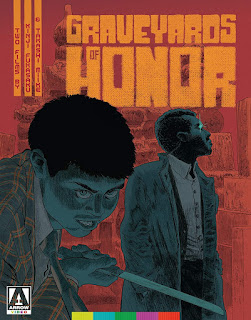Graveyards of Honor
The yakuza - or gangster - film is more deeply ingrained in Japanese cinema than perhaps any other genre. Likely because the rise to power in those post-war years is best translated by the gritty, violent stories of outlaws, ambition and family honor. And the work of director Kinji Fukasaku is most representative of the genre's style and conventions, notably in his epic Battles Without Honor and Humanity and its sequel. Yet his 1975 film - Graveyard of Honor - bucks many of those traditions to deliver a yakuza tale that paints a much more severe and nihilistic view of the yakuza lifestyle.
The ambitious but singularly self-destructive Rikio (Tetsuya Watari) refuses to take orders from anyone, even his own godfather. After being banished from the family, he falls under the protection of a rival gang headed up by his friend Kozaoburo Imai, but even that relationship is strained by Rikio's unpredictable behavior. Together with his "wife" - Chieko - the pair fall into a drug-addicted lifestyle as Rikio burns every bridge left behind him.
Based on a true story, Fukasaku's film never even attempts to turn Rikio into the traditional anti-hero. He's a rapist, liar, murderer, and thief; there's simply nothing redeemable about him. If you're thinking that makes for a tough sell, you're right. Graveyard of Honor is never a pleasant film to watch, especially its treatment of women. But, as a character, Rikio doesn't discriminate; he's awful to everyone, flouting the yakuza code indiscriminately and betraying everyone he comes into contact with.
But that certainly seems to be Fukasaku's point, especially in the casting Watari, whose roles in Tokyo Drifter and the Outlaw: Gangster VIP series cast him as a flawed but essentially noble outsider. Here there is no glamorizing. It's street level filmmaking of the highest order, with the camera swirling through the chaos unfettered by traditional compositions. There's a tip of the hat to Godfather-esque inspirations with sepia-tone sequences and time stamps to emphasize the history of it all. But in Fukasaku's film the gangster's downfall is less a tragedy than a foregone conclusion.
Equally powerful, and maybe more disturbing, is Takashi Miike's 2002 remake, which follows the same plot points of Rikuo's sociopathic tendencies and adds gallons more blood. But unlike Fukasaku, whose camera seemed to be an active participant in the violence, Miike brilliantly takes the opposite approach, framing the most powerful scenes with static compositions that somehow make things even more uncomfortable.
Arrow Video's two disc special edition Blu-ray includes both films (both looking terrific), audio commentaries, visual essays and a huge selection of archival extras, plus a limited edition collector's booklet. Not every yakuza film is worth buying, but this is one hell of a set!




Comments
Post a Comment